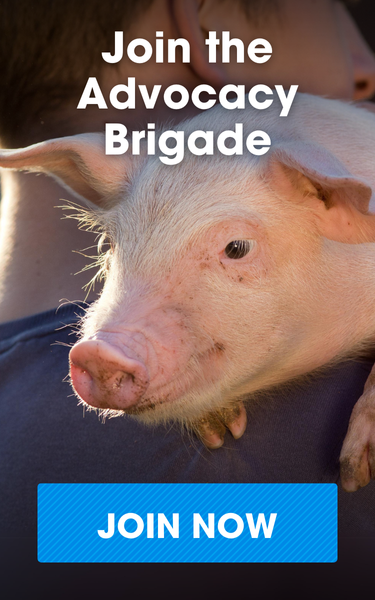
The Farm Bill Fails Animals in Need

While animal welfare may not instantly spring to mind when people think of the federal Farm Bill, the lives of animals—and not just farm animals—vitally depend on this massive piece of legislation.
Due for reauthorization this year, the Farm Bill impacts the lives of billions of animals—from pigs, chickens and cows raised on American farms to dogs suffering in puppy mills. That enormous responsibility is all but abandoned in the version of this bill approved by the House. It turns a blind eye toward inhumane and environmentally destructive factory farms which cruelly confine animals, spew toxic emissions and put rural communities at risk by polluting their air and water.
The single greatest threat to animal welfare in the Farm Bill is Rep. Steve King’s (R-IA) “Protect Interstate Commerce Act” (PICA), which was added as an amendment to the House bill. Ostensibly designed to protect the agriculture industry from unnecessary state-by-state regulations, the measure would actually strip states of their Constitutional right to protect the well-being of their own animals and residents.
If enacted, PICA would nullify laws in California, Florida, Arizona, Massachusetts and several other states designed to prevent cruel confinement systems including battery cages and gestation crates. It could also wipe out groundbreaking laws in Maryland, California and hundreds of jurisdictions that ban the sale of dogs from puppy mills in pet stores, threatening much of the progress made to stop cruel puppy mills. Additionally, PICA would eliminate state prohibitions on such appalling practices as the sale of dog, cat and horse meat.
The scope of King’s bill is so vast—encompassing any agricultural product—that it could also harm public health by threatening product labeling requirements and food safety standards. It’s no exaggeration to say that the passage of a Farm Bill including PICA would be one of the most disastrous setbacks to animal protection in modern history. Beyond the animal welfare implications, the poorly drafted and broad language would also have a sweeping impact on a host of other issues, including food labeling, public health and safety, narcotics, tobacco and even ethanol regulations.
A responsible, compassionate Farm Bill would reject reckless provisions like PICA and include sensible measures that protect animals from cruelty and suffering by promoting alternatives to factory farming. Reps. Vern Buchanan (R-FL) and Earl Blumenauer (D-OR) drafted a letter to House Leadership calling for the rejection of the King Amendment. The letter has bipartisan support from dozens of Representatives.
In addition, Reps. Blumenauer and Jared Huffman (D-CA), and others have introduced bills that would allocate new funding and create research programs to support a more humane and transparent farming system. These include measures to support farmers participating in independent animal welfare certification programs, increase the number of animal welfare-certified farmers and encourage the prioritization of pasture-based farming systems.
The Farm Bill recently passed in the House does not include any of these important provisions, unfortunately. Thankfully, the Senate version advances animal welfare and does not include the dangerous King amendment.
In a larger sense, the Farm Bill reflects a fork in the road of our cultural progress, and the two paths could not be more different. Down one is a blind allowance of provisions like Rep. King’s that enable abject cruelty in the animal agriculture industry. Down the other is a commitment to food systems that align with our society’s concern and compassion for animal welfare.
Which path we take is not only up to Congress. It’s up to all of us to speak out for vulnerable animals and we call on Congress to reject PICA and produce a Farm Bill that responsibly protects animals and our well-being.
Originally published on The Hill.

